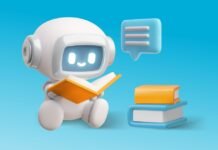The Rise of AI Tutors in Early Reading Instruction
Embracing Virtual Learning Aids
In recent years, virtual tutors powered by artificial intelligence have become a staple in elementary school classrooms. These innovative programs are designed to help young students, particularly those in kindergarten and first grade, enhance their reading skills through interactive learning experiences. By listening to children read aloud and providing instant feedback, these digital solutions aim to facilitate a deeper understanding of phonics and reading comprehension.
AI’s Growing Presence in Education
One of the most prominent platforms in this realm is Amira Learning, which has secured contracts across ten states. Major educational publishers, such as McGraw Hill and Curriculum Associates, are also integrating similar AI-driven tools into their literacy programs. These advancements are not merely technological novelties; they promise to address the pressing challenge of providing individualized reading practice for young learners.
The Challenge of Personalized Learning
As students begin their reading journey, they must connect spoken sounds to written letters. This process requires frequent practice and guidance, which can be a logistical nightmare for teachers managing large classrooms. With diverse learning needs among students, from those requiring additional support to others ready for advanced material, offering personalized instruction becomes a daunting task.
The Research Gap in AI Effectiveness
Despite the adoption of these AI tools, research on their effectiveness in improving reading outcomes remains inconclusive. Questions arise about their ability to accurately interpret children’s speech, save teachers time, and ultimately enhance student learning. Comparing the results of AI tutoring with traditional methods remains a critical area of inquiry.
The Need for Rigorous Studies
Matt Burns, a professor of special education at the University of Florida, emphasizes the lack of rigorous studies needed to evaluate the efficacy of AI in reading instruction. He is involved in ongoing research through the University of Florida Literacy Institute, aimed at studying AI integration within early reading curricula.
The Evolution of AI Capabilities
Henry May, a professor at the University of Delaware, notes that the sophistication of AI tools for education has only recently reached a level where meaningful evaluation can occur. The rapid advancements in AI technology present an opportunity for improved outcomes, yet thorough assessments are still in their infancy.
AI’s Role in Instructional Decision-Making
Beyond providing direct reading assistance, emerging research suggests that AI can also support teachers in making data-driven instructional decisions. By analyzing student performance, AI tools can help educators tailor their approaches, leading to more effective teaching strategies.
How AI Tutors Differ from Traditional Methods
While digital reading programs have existed for years, AI-enabled platforms represent a significant shift. Unlike traditional methods that employ multiple-choice questions, AI tutors engage students in meaningful dialogue, simulating interactions with a live tutor. This approach may foster greater learning outcomes by requiring students to articulate responses rather than simply select from a list of options.
The Challenge of Speech Recognition
Developing effective AI tutors requires adapting speech recognition technology to understand children’s unique speech patterns. This involves not only capturing their voices but also filtering out background noise from bustling classrooms. Ran Liu, chief AI scientist at Amira, stresses the importance of ensuring these tools function effectively in real-world classroom environments.
Evaluating the Impact of AI Programs
Recent studies have begun to explore the impact of AI programs like Amira on student learning. Research indicates that students who engage with these tools show statistically significant improvements in early literacy skills. However, limitations exist, such as the optimal duration of use, with findings suggesting that 25 to 30 minutes of engagement may yield the best results.
Competing AI Solutions in the Market
In addition to Amira, SoapBox Labs has emerged as another key player in the AI education landscape. Acquired by Curriculum Associates, SoapBox’s technology focuses on enhancing reading fluency through interactive exercises. However, comprehensive evaluations of its effectiveness on student reading achievement are still pending.
Mixed Results in Comparative Studies
Research comparing AI tutoring to traditional methods has yielded mixed results. For example, studies involving Chinese kindergarteners indicated that while AI chatbots improved language development, reading with a parent produced superior outcomes in listening comprehension. This highlights the complexity of assessing AI’s role in literacy education.
The Promise of Tailored AI Solutions
As AI continues to develop, its potential extends beyond tutoring. Researchers are investigating how AI can assist in lesson planning and generating customized reading materials. The challenge lies in creating decodable texts that align with specific phonics patterns, a need that many educators report is currently unmet.
Addressing Quality in Text Generation
Recent studies have shown that commercially available AI tools often struggle to generate suitable texts for early readers. Researchers at the University of Texas at Austin found that these tools frequently produced texts that were either too complex or unnatural. This raises concerns about the quality of reading materials generated by AI.
Innovations in Decodable Text Creation
To tackle the issue of quality, Project Read AI has developed a tool that generates personalized decodable texts aligned with various curricula. Collaborating with the University of Florida Literacy Institute, this initiative promises to provide engaging reading materials tailored to students’ phonics needs.
Developing AI for Personalized Instruction
The AI Reading Enhancer, currently in development at the State University of New York at Buffalo, aims to produce customized reading passages based on students’ interests and cultural backgrounds. This innovative approach will also utilize speech recognition technology to evaluate student performance and deliver corrective feedback.
Ensuring Ethical AI Development
As the integration of AI in education expands, researchers emphasize the need for strong privacy protections and ethical guidelines. X. Christine Wang, the principal investigator for the AI Reading Enhancer, acknowledges the necessity of rigorous safeguards, particularly when dealing with young learners.
Looking Ahead: The Future of AI in Reading Education
The landscape of early literacy instruction is rapidly evolving, with AI tools offering exciting possibilities. However, as educators and researchers navigate these advancements, careful consideration must be given to their implementation and effectiveness. The journey toward fully integrating AI into reading education is just beginning, and ongoing research will be crucial in determining its ultimate impact.
Conclusion: A New Chapter in Literacy Instruction
As AI technology continues to mature, its role in education is likely to expand. While there are still questions to be answered and challenges to overcome, the potential for AI tutors to transform early reading instruction is undeniable. By providing personalized support, these tools may ultimately help young learners develop the foundational skills they need to succeed in their educational journeys.







